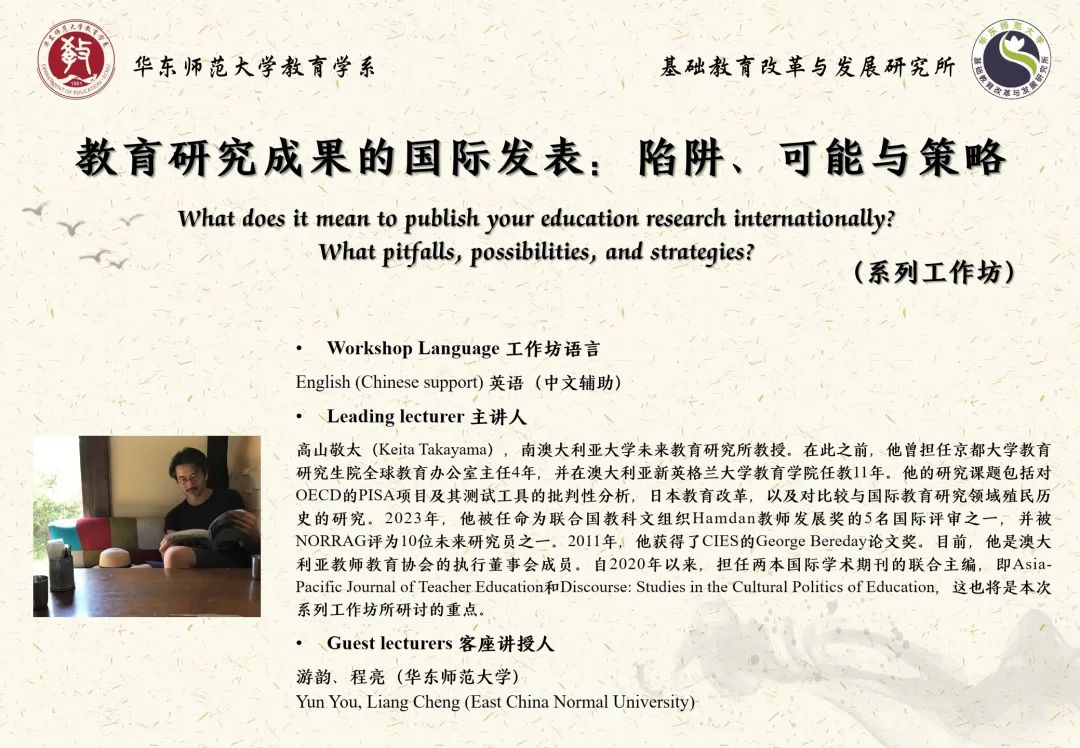
工作坊主题
教育研究成果的国际发表:陷阱、可能与策略
(What does it mean to publish your education research internationally? What pitfalls, possibilities, and strategies?)
工作坊语言
英语(中文辅助)
主讲人简介
高山敬太(Keita Takayama),南澳大利亚大学未来教育研究所教授。在此之前,他曾担任京都大学教育研究生院全球教育办公室主任4年,并在澳大利亚新英格兰大学教育学院任教11年。他的研究课题包括对OECD的PISA项目及其测试工具的批判性分析,日本教育改革,以及对比较与国际教育研究领域殖民历史的研究。2023年,他被任命为联合国教科文组织Hamdan教师发展奖的5名国际评审之一,并被NORRAG评为10位未来研究员之一。2011年,他获得了CIES的George Bereday论文奖。目前,他是澳大利亚教师教育协会的执行董事会成员。自2020年以来,担任两本国际学术期刊的联合主编,即Asia-Pacific Journal of Teacher Education和Discourse: Studies in the Cultural Politics of Education,这也将是本次系列工作坊所研讨的重点。
客座讲授人
游韵、程亮(华东师范大学)
地点
文科大楼 913室
日程安排:
Day 1(6 月17日,星期一,15:00-17:00)
Understanding the global knowledge structure
理解全球知识结构
Day 2(6月18日,星期二,15:00-17:00)
A Chinese proposal for challenging the structure
挑战现有知识结构的中国方案
Day 3(6月19日,星期三,15:00-17:00)
A Japanese proposal for challenging the structure
挑战现有知识结构的日本方案
Day 4(6月20日,星期四,15:00-17:00)
Educational theorising from East Asia (Philosophy & policy)
东亚的教育理论建构(哲学与政策)
Day 5(6月21日,星期五,15:00-17:00)
Educational theorising from East Asia (Philosophy)
东亚的教育理论建构(哲学)
Day 6(6月24日,星期一,15:00-17:00)
Educational theorising from East Asia (Anthropology)
东亚的教育理论建构(人类学)
Day 7(6月25日,星期二,15:00-17:00)
Educational theorising from East Asia (Psychology & policy)
东亚的教育理论建构(心理学与政策)
工作坊介绍
This workshop is designed to help students explore what it means to publish internationally (in English) today. To consider this question is important because not just university academics but graduate students around the world are under increasing pressure to publish their research in English and teach or enrol in English-medium classes (just like this seminar!). Where does this pressure come from? What consequences, both desirable and undesirable, has this pressure created for our academic knowledge work? What are the strategies that we can deploy to navigate the pressure while at the same time keeping at bay its undesirable consequences for our knowledge work? These are the kind of questions that you are invited to explore throughout this seminar.
该工作坊旨在帮助学生探讨在国际上发表英文论文意味着什么。这个问题的重要性在于世界各地的大学学者和研究生们都面临着越来越大的压力。他们被要求用英语发表研究成果,并在课堂上以英语进行教学(就像本活动一样!)。这种压力从何而来?又给学术知识工作带来哪些可取和不可取的后果?如何应对这种压力,同时避免其导致的不良后果?本次系列工作坊将会探讨以上问题。
More concretely, the workshop is divided roughly into three parts. The first part of the course examines the global structure of academic knowledge production. The term ‘structure’ is used here to denote a particular pattern in which academic knowledge has been produced and how it has set limits on what knowledge we generate and how. Two ‘structural’ issues are particularly identified here. First is the intellectual division of labour on a global scale, wherein some are given the ‘universal’ voice (theory), while others are positioned as the producer of ‘particular’ knowledge (data). Second is the problem of ‘West as method,’ where non-Western researchers consistently use ‘Western experience’ or ‘Western theory’ as a point of reference to understand themselves and their contexts. These concepts should help us understand how we are currently positioned within the global structure of knowledge and how we might be able to reposition ourselves in relation to the structure. The second part of the course invites us to explore a range of scholarship, both in and outside education, that has engaged critically with the broader politics of academic knowledge production. Some of the concepts to be explored in this section include Decolonial, Southern Theory, and Asia as Method. The third, final part of the course focuses on some of the exemplary education scholarship coming out of East Asia that draws upon ‘Eastern’ thoughts, data and practices to disrupt the global structure of academic knowledge. Here, attention is given to a group of scholars that foreground East Asia as a meaningful unit of analysis for educational research. Overall, it is my hope that the workshop will enable us to participate in the global academic knowledge production in a most thoughtful, reflexive manner.
更具体地说,工作坊大致分为三个部分。第一部分聚焦于探讨学术知识生产的全球结构。这里使用的“结构”一词指的是学术知识生产的特定模式。这种模式设定了生产什么知识和如何生产知识。这里特别指出两个“结构”问题:一是全球范围内的知识分工,其中一些被赋予“普遍”的话语权(理论),而另一些则被定位为“特殊”知识(数据)的生产者;二是“西方作为方法”的问题,即非西方研究人员始终将“西方经验”或“西方理论”作为理解自身及其背景的参照点。这些概念应有助于理解目前我们在全球知识结构中的定位,以及如何重新定位自己与知识结构的关系。第二部分着重于探讨教育内外的一系列学术研究。这些研究以批判性的态度审视更广泛的学术知识生产政治。这一部分将探讨去殖民主义、南方理论和亚洲作为方法等相关概念。最后一部分重点关注具有代表性的东亚教育学术成果。这些成果利用“东方”思想、数据和实践来打破全球学术知识结构。在此,我们将关注以东亚作为教育研究的有意义的分析单位的学者群体。总之,我希望本次工作坊能让同学们以思考最深入、反思最深刻的方式参与全球学术知识的生产。
The workshop will take a dialogical approach to teaching. This means that I organize my teaching around a set of open-ended questions for discussion and that students are expected to actively participate in the discussion. I will stay away from the conventional lecture format as much as possible, though I might resort to it if requested. You are expected to read the assigned reading(s) as much as possible prior to coming to the seminar, so you can seek clarification in the seminar if you are unsure. On the day when you are responsible for introducing the assigned article, I’d like you to prepare a quick verbal summary of the article and two open-ended questions to kick start the in-class discussion.
该工作坊将采用对话式教学方法。这意味着本次工作坊将围绕一系列开放式问题组织教学,供学生讨论,并要求学生积极参与讨论。本次工作坊会尽量避免采用传统的讲授形式,但如果学生提出要求,也可能会采用这种形式。希望同学们在活动前充分阅读必读文献,以便在研讨中遇到不确定的问题时可以及时澄清。当你们负责介绍必读文献时,我期望各位能预先准备好对文章的精炼概述,并提出两个开放式问题以开启研讨。
参与方式
请扫描下方二维码报名参与本次系列工作坊活动。
(注:本次工作坊仅限线下参与)

欢迎各位老师、同学们参与本次工作坊!
